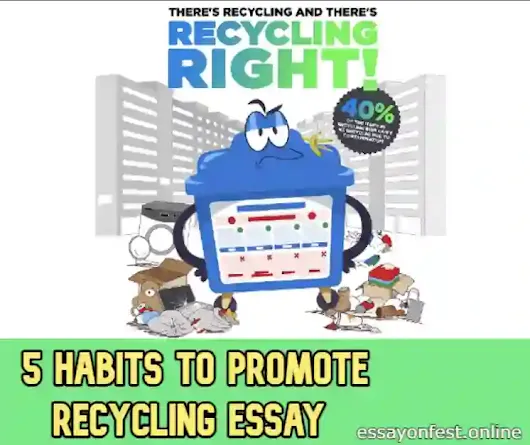5 Habits To Promote Recycling Essay
Introduction:
Recycling plays an important role in conserving natural resources, reducing waste, and reducing the negative impact of human activities on the environment. Developing recycling habits is essential to building a sustainable future. In this essay, we will explore five effective habits that individuals can adopt to promote recycling and contribute to a healthier planet.
Segregation of Waste:
The first step towards effective recycling is proper segregation of waste. It is important to separate recyclable materials such as paper, cardboard, glass, plastic and metal from non-recyclable waste. By installing designated recycling bins at home and workplaces, individuals can ensure that materials are properly sorted before reaching recycling facilities.
Education and Awareness:
It is important to educate yourself and spread awareness about the importance of recycling. People need to understand the environmental benefits of recycling and the consequences of improper waste disposal. Schools, community centers and social media platforms can be used to promote recycling knowledge and encourage responsible waste management.
Reducing single-use items:
Reducing the consumption of single-use items is an important step towards promoting recycling. Items such as disposable plastic water bottles, straws and shopping bags contribute to excessive waste. By choosing reusable alternatives such as stainless steel water bottles and cloth bags, individuals can reduce their carbon footprint and reduce the demand for new materials.
Helpful Recycling Programs:
Another effective habit is to support local recycling programs and initiatives. Participating in curbside recycling programs offered by municipalities or taking recyclable materials to collection centres can make a significant impact. Additionally, encouraging businesses and local governments to establish and maintain effective recycling systems can lead to more efficient waste management in the community.
Composting from organic waste:
Composting is a practice that can significantly reduce the amount of organic waste going into landfills. By composting kitchen scraps, yard trimmings and other biodegradable materials, individuals can create nutrient-rich soil amendments that benefit gardens and landscapes. This reduces the burden on landfills and completes the cycle of waste reduction.
Conclusion:
In conclusion, adopting these five habits – waste segregation, education and awareness, reducing single-use items, supporting recycling programs and composting – can contribute greatly to the promotion of recycling and the overall sustainability of our planet.
By making these habits a part of our daily lives, we can collectively work towards reducing waste, conserving resources and protecting the environment for future generations. The journey towards a greener world begins with individual actions that create a positive global impact.
Also read: What Are The 5 Habits You Can Adopt To Reduce Waste And Promote Recycling Essay
Also read: Essay On What Are The Five Habits You Can Adopt To Reduce Waste And Promote Recycling
Also read: One Earth One Family Save Earth Essay 150 Words for Class 1
Also read: 5 Habits To Reduce Waste And Promote Recycling Essay
Also read: Meri Mati Mera Desh Slogan In Hindi
THANK YOU SO MUCH

ReplyDelete"5 Habits to Promote Recycling" presents a compelling guide to fostering eco-conscious behavior. The essay emphasizes the importance of segregating waste, encouraging community participation, and raising awareness about recyclable materials. With practical tips on reducing single-use items and repurposing goods, this blog champions sustainable practices for a greener future."
mejores abogados de accidentes de moto